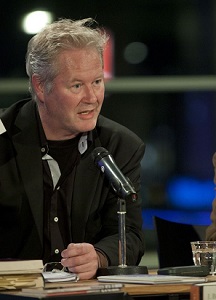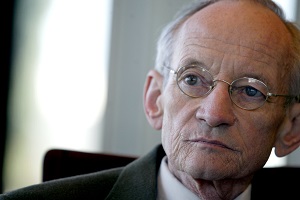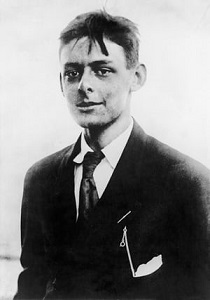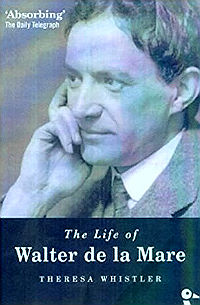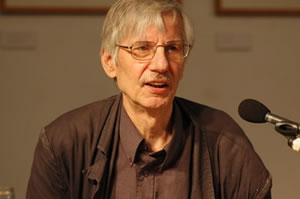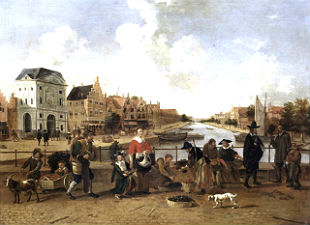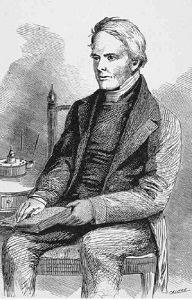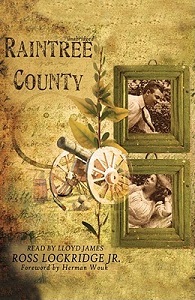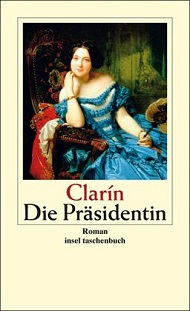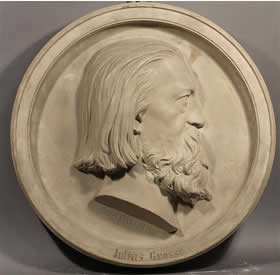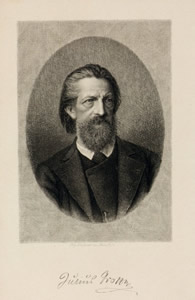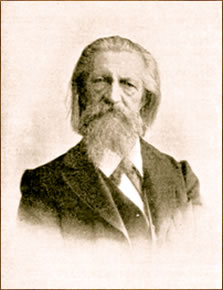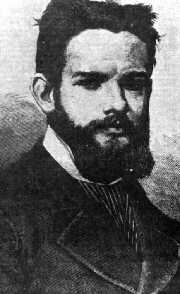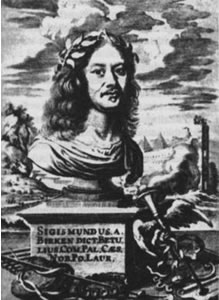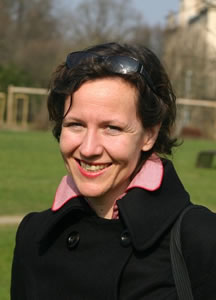De Nederlandse dichter Erik Menkveld werd geboren op 25 april 1959 in Eindhoven. Zie ook alle tags voor Erik Menkveld op dit blog.
Meisje met eekhoorns
Goed als brood zit zij met het jong op schoot
terwijl de groten om haar benen stoeien.
En zo vertrouwd is haar dit schuwe dat haar
uit het bos toestroomt dat zij ze niet meer ziet,
eekhoorns en bomen. Mij en heel de roekeloos
veranderlijk bestaande stad die mij omgeeft
brengt zij tot stand vanuit dat veel te hoge hoofd;
hier fiets ik, onverklaarbaar volledig aanwezig,
op een brug in Amsterdam-Zuid – vreemde inval
van een stenen meisje, dat even haar ogen sluit.
Eerlijke uren
Met mijn opgeruimdste gezichten een dag beginnen:
probeer ik het eens, blijkt hij niet op te lichten. Niks geen
schaarsgbebloemde voorbijgangerslach in mijn raam
of dat kind op haar vuurrode fietsje dat me wolkenloos
zwaaide en zag – eerlijke uren
waren het vandaag. Dodelijke,
onverkwikkelijke, hopeloos
uitgekeken uren.
Ik ben al bijna bij je
Hoe nabij ik ook toesla, na een tijdje
lijk ik weer verdwenen als altijd.
Maar hoe ver ik ook wegtrek uit je veilige
heden, altijd ben ik naar je onderweg
en blijf ik in je aan het woord, net
niet verstaan door je schichtige oren
die van geen stilte mij onderscheiden.
En voor je het weet ga ik weer in je
tekeer en flakkert je denken als kaarslicht
onder mijn maanloze vlagen. Hoor maar.
Kom ik als ziekte dan snoep ik al aan je.
Kom ik als diepte, dan zul je mijn bodem
nooit raken. Kom ik als water dan lijken
mijn oevers in niets op een kade.
Ik ben al bijna bij je. Als een zuigeling
een wereldoorlog zul je mij smaken.
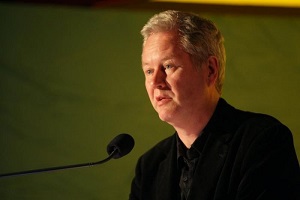
Erik Menkveld (25 april 1959 – 30 maart 2014)
De Amerikaanse dichter Ted Kooser werd geboren op 25 april 1939 in Ames, Iowa. Zie ook alle tags voor Ted Kooser op dit blog.
Abandoned Farmhouse
He was a big man, says the size of his shoes
on a pile of broken dishes by the house;
a tall man too, says the length of the bed
in an upstairs room; and a good, God-fearing man,
says the Bible with a broken back
on the floor below the window, dusty with sun;
but not a man for farming, say the fields
cluttered with boulders and the leaky barn.
A woman lived with him, says the bedroom wall
papered with lilacs and the kitchen shelves
covered with oilcloth, and they had a child,
says the sandbox made from a tractor tire.
Money was scarce, say the jars of plum preserves
and canned tomatoes sealed in the cellar hole.
And the winters cold, say the rags in the window frames.
It was lonely here, says the narrow country road.
Something went wrong, says the empty house
in the weed-choked yard. Stones in the fields
say he was not a farmer; the still-sealed jars
in the cellar say she left in a nervous haste.
And the child? Its toys are strewn in the yard
like branches after a storm—a rubber cow,
a rusty tractor with a broken plow,
a doll in overalls. Something went wrong, they say.
Death of a Dog
The next morning I felt that our house
had been lifted away from its foundation
during the night, and was now adrift,
though so heavy it drew a foot or more
of whatever was buoying it up, not water
but something cold and thin and clear,
silence riffling its surface as the house
began to turn on a strengthening current,
leaving, taking my wife and me with it,
and though it had never occurred
to me until that moment, for fifteen years
our dog had held down what we had
by pressing his belly to the floors,
his front paws, too, and with him gone
the house had begun to float out onto
emptiness, no solid ground in sight.
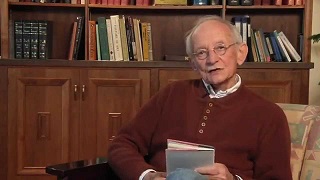
Ted Kooser (Ames, 25 april 1939)
De Engelse dichter, schrijver, criticus en letterkundige James Fenton werd geboren op 25 april 1949 in Lincoln. Zie ook alle tags voor James Fenton op dit blog.
Uit: The need to complete (Over T.S. Eliot)
“With Eliot, the need is far greater: there is much, much more in the way of uncollected and unavailable prose: 700 uncollected items, all kinds of ephemeral pieces, many of them missing from the standard bibliography, which is itself due for complete revision. The new bibliography is under way, in the hands of Archie Henderson.
The Complete Poems – two volumes of it – is also in hand. Christopher Ricks is the editor and publication is perhaps three years away. In this case, it is not that we expect another “Waste Land” to turn up. It is a matter of wanting to see the work whole – great poems, dreadful poems, trivia, whatever there is. When it comes to a poet like this, I’m a staunch completist.
Then there is the stalled edition of the Collected Letters, which began so well with a first volume in 1988, edited by Valerie Eliot. That first volume is now due for revision and, together with a second volume, is due out in 2009, with Hugh Haughton at the helm. Thereafter things are expected to proceed at a modest pace.
But it is the collected prose that really interests me: the essays and reviews, the lectures, everything from the most substantial pieces to the critical ephemera. Seven volumes are planned, with publication shared between Faber in London and Johns Hopkins University in the US. Here the editor is Ronald Schuchard, who has already, along with Ricks, spent years tracking things down. Once again, 2009 is the year in which we will begin to be able to see the results.
A foretaste is provided by Schuchard in the current issue of the magazine Areté. As is well known, Eliot spent much of his adult life as a publisher at Faber, in whose archives there are 40 box-files to do with the Criterion, the magazine Eliot edited, and 120 box-files of correspondence as a publisher, representing, as Schuchard puts it, “43 years of daily engagement with a world-wide literary clientele”.

James Fenton (Lincoln, 25 april 1949)
T. S. Eliot
De Engelse dichter Walter John de la Mare werd geboren op 25 april 1873 in Charlton, Kent. Zie ook alle tags voor Walter John de la Mare op dit blog.
The Mother Bird
Through the green twilight of a hedge
I peered, with cheek on the cool leaves pressed,
And spied a bird upon a nest:
Two eyes she had beseeching me
Meekly and brave, and her brown breast
Throbb’d hot and quick above her heart;
And then she oped her dagger bill, –
‘Twas not a chirp, as sparrows pipe
At break of day; ’twas not a trill,
As falters through the quiet even;
But one sharp solitary note,
One desperate, fierce, and vivid cry
Of valiant tears, and hopeless joy,
One passionate note of victory:
Off, like a fool afraid, I sneaked,
Smiling the smile the fool smiles best,
At the mother bird in the secret hedge
Patient upon her lonely nest.
The Empty House
See this house, how dark it is
Beneath its vast-boughed trees!
Not one trembling leaflet cries
To that Watcher in the skies—
‘Remove, remove thy searching gaze,
Innocent of heaven’s ways,
Brood not, Moon, so wildly bright,
On secrets hidden from sight.’
‘Secrets,’ sighs the night-wind,
‘Vacancy is all I find;
Every keyhole I have made
Wails a summons, faint and sad,
No voice ever answers me,
Only vacancy.’
‘Once, once … ’ the cricket shrills,
And far and near the quiet fills
With its tiny voice, and then
Hush falls again.
Mute shadows creeping slow
Mark how the hours go.
Every stone is mouldering slow.
And the least winds that blow
Some minutest atom shake,
Some fretting ruin make
In roof and walls. How black it is
Beneath these thick boughed trees!
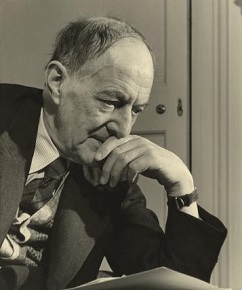
Walter John de la Mare (25 april 1873 – 22 juni 1956)
De Duitse dichter en schrijver Richard Anders werd geboren op 25 april 1928 in Ortelsburg, tegenwoordig Szczytno, Polen. Zie ook alle tags voor Richard Anders op dit blog.
Eden in der Hölle
In diesem Garten
stehen Adam und Eva
auf einem anderen Feigenblatt
Keine Frage mehr
nach dem Stachel
wenn das Paar vorzieht
zu verdunsten da begossen
alles sich Bäumende
für die Säge strotzt
Weißes Entsetzen
…Wollte ich mich eben noch auflösen so genügt mir jetzt dieser Flug aus Raum und Zeit mit dem einen Flügel meines länger und länger werdenden Schattens so genügt mir jetzt das einzigartige Panorama am Steuer dieses aus völliger Dunkelheit geschaffenen Fahrzeuges ohne jede Möglichkeit anzuhalten und ich bin außer mir während meine geschlossenen Füße immer noch den Steinfußboden eines städtischen Balkons berühren und die Armbanduhr an meinem schlaff herabhängenden Arm weitertickt und das Herz mitten im Hirn flattert dessen Käfigstäbe langsam zu blauem Rauch zergehen und in den Hochhausfenstern sich metallisch die Skalen des Rots einer mit jedem Atemzug langsam untergehenden Sonne spiegeln und ich die Kälte eines Meeres ohne Wasser spüre eine Art lautlose Unendlichkeit in der die Empfindungen langsam nachlassen und die Träume nicht mehr für Augenblicke erstarren und ich das Weiß ahne das keine Farbe mehr ist das schwarze Weiß das Grau in der Erinnerung zusammenstürzender Wogen wenn das Aufhören des Pulsschlags kein Erschrecken mehr auslöst dieses Namenlose diese unbekannte Oberfläche die nichts mehr verbirgt deren Zustand an keinen Augenblick mehr erinnert…
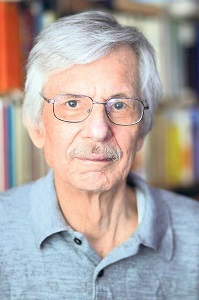
Richard Anders (25 april 1928 – 24 juni 2014)
De Amerikaanse schrijver en vertaler Murray Fletcher Pratt werd geboren op 25 april 1897 in een reservaat in Buffalo, New York. Zie ook alle tags voor Fletcher Pratt op dit blog.
Uit: The Blue Star
“It was raining steadily outside. The older woman’s tears and words fell in time, drip, drip. Cold, for the tall window at the room’s end would never quite shut close, bottom and top not nest into the frame simultaneously. Lalette in her soutane felt goose-pimples and tried to shut out the sound by thinking of a man with a green hat who would give her a handful of gold scudi and nothing asked, merely because it was spring and she put a small spell on him with a smile, but it was not quite spring, and the voice persisted:
“. . . all my life—I have hoped—hoped and planned for you—even before you were born—even before you were born—daughter of my own—” (Yes, thought Lalette, I have heard that before, and it would move me more, but the night you drank the wine with Dame Carabobo, you told her how I was the product of a chance union in a carriage between Rushaca and Zenss) “—daughter—and after I saved and worked so hard—you miss the only chance—the only chance—don’t know what I’m going to do—and Count Cleudi’s not like most—”
“You told him what he offered was frightful. I heard you.”
(Sob) “It was. Oh, it was. Oh, Lalette, it isn’t right, you should be married with a gold coach and six horses—but what can we do?—oh, if your father had left us anything before the war—all I sacrificed for him—but that is what all of us must do, make sacrifices, we can’t have anything real without giving something away . . . Lalette!”
“Madame.”
“You will be able to employ the Art and have everything you want, you know most of the patterns already, he does not go to the Service often . . . and after all, it’s something that happens to every woman one way or another, and with the Art, even if he doesn’t marry you, he’ll find you a husband you won’t mind, it’s only men like Cleudi who want to be the first, a man who marries would really prefer a girl to have a little experience, I know . . . Lalette!”
Lalette did not answer.
“All the young ones come to the ball after the opera, Lalette. Count Cleudi will present you, and even if you don’t bring—”
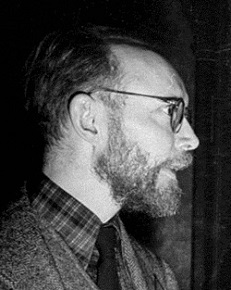
Fletcher Pratt (25 april 1897 – 10 juni 1956)
De Engelse essayist en diplomaat Sir William Temple werd geboren in Londen op 25 april 1628. Zie ook alle tags voor Willam Temple op dit blog.
Uit: Observations upon the United Provinces of the Netherland
“And I have had occasion to make experiment of the sands rising and sinking before a haven, by two fits of these contrary winds, above four feet. • This, I presume, is likewise the natural reason of so many deep and commodious havens found upon all the English side of the channel, and so few (or indeed none) upon the French and Dutch : an advantage seeming to be given us by nature, and never to be equalled by any art or expence of our neighbours. I remember no mention in ancient authors of that which is now called the Zudder sea; which makes me imagine that it may have been formed likewise by some great inundation, breaking in between the Tessel-islands, and others, that lie still in a line contiguous, and like the broken remainders of a continued coast. This seems more probable, from the great shallowness of that sea, and flatness of the sands, upon the whole extent of it ; from the violent rage of the waters breaking in that way, which threaten the parts of North-Holland about Medenblick and Enchusen, and brave it over the highest and strongest digues of the Province, upon every high tide, and storm at North-West; as likewise from the names of East and West Friezland, which should have been one continent, till divided by this sea: for, in the time of Tacitus,” no other distinction was known, but that of greater or lesser Frizons, and that only from the measure of their numbers, or forces; and, though they were said to have great lakes among them, yet that word seems to import they were of fresh water, which is made yet plainer by the word ambiunt, that shews those lakes to have been inhabited round by these nations ; from all this I should guess, that the more inland part of the Zudder sea was one of the lakes there mentioned, between which and the Tessel and Ulie islands there lay anciently a great tract of land.(where the sands are still so shallow, and so continued, as seems to make it evident) but since covered by some great irruptions of waters, that joined those of the sea and the lake together, thereby made that great bay, now called the Zudder sea, by favour whereof the town of Amsterdam has grown to be the most frequented haven of the world. Whatever it was, whether nature or accident, and upon what occasion soever it arrived, the soil of the whole Province of Holland is generally flat, like the sea in a calm, and looks as if after a long contention between land and water, which it should belong to, it had at length been divided between them : for to consider the great rivers, and the strange number of canals that are found in this Province, and do not only lead to every great town, but almost to every village, and every farmhouse in the country ; and the infinity of sails that are seen everywhere coursing up and down upon them; one would imagine the water to have shared with the land, and the people that live in boats to hold some proportion with those that live in houses.”
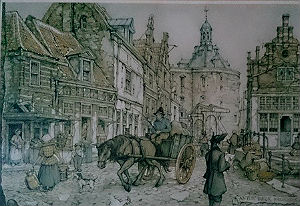
William Temple (25 april 1628 – 27 januari 1699)
Enkhuizen door Anton Pieck
De Engelse dichter en predikant John Keble werd geboren op geboren 25 april 1792 in Fairford, Gloucestershire. Zie ook alle tags voor John Keble op dit blog.
St. Mark’s Day
Oh! who shall dare in this frail scene
On holiest happiest thoughts to lean,
On Friendship, Kindred, or on Love?
Since not Apostles’ hands can clasp
Each other in so firm a grasp
But they shall change and variance prove.
Yet deem not, on such parting sad
Shall dawn no welcome dear and glad:
Divided in their earthly race,
Together at the glorious goal,
Each leading many a rescued soul,
The faithful champions shall embrace.
For e’en as those mysterious Four,
Who the bright whirling wheels upbore
By Chebar in the fiery blast.
So, on their tasks of love and praise
This saints of God their several ways
Right onward speed, yet join at last.
And sometimes e’en beneath the moon
The Saviour gives a gracious boon,
When reconciled Christians meet,
And face to face, and heart to heart,
High thoughts of holy love impart
In silence meek, or converse sweet.
Companion of the Saints! ’twas thine
To taste that drop of peace divine,
When the great soldier of thy Lord
Called thee to take his last farewell,
Teaching the Church with joy to tell
The story of your love restored.
O then the glory and the bliss,
When all that pained or seemed amiss
Shall melt with earth and sin away!
When saints beneath their Saviour’s eye,
Filled with each other’s company,
Shall spend in love th’ eternal day!

John Keble (25 april 1792 – 29 maart 1866)
Sint Marcus door Il Pordenone, ca. 1635
De Spaanse schrijver Leopoldo Alas (wereldwijd bekend als ‘Clarín’) werd geboren op 25 april 1852 in Zamora. Zie ook alle tags voor Leopoldo Alas op dit blog.
Uit: Die Präsidentin (Vertaald door Egon Hartmann)
„Bis zur zweiten Plattform, einer feingliedrigen Balustrade, stieg er wie eine wehrhafte Feste empor. Von dort setzte er sich in einer anmu-tigen, in Maßen und Proportionen unnachahmlichen Pyramide Fort. Wie ein Bündel von Muskeln und Nerven wanden sich die Steine, immer weiter zurücktretend, in die Höhe, balancierten wie Seilkünstler in der Lufi, und auf einer Kalksteinspitze saß, ein Wun-der an Jonglierkunst gleichsam, wie von einem Magneten gehal-ten, eine große, vergoldete Bronzekugel, darauf eine zweite, klei-nere und auf dieser ein Kreuz aus eisen, das in einen Blitzableiter auslief. Wenn das Kapitel zu den großen Kirchenfesten den Turm mit Lampions und bunten Laternen beleuchten ließ, bot diese gro-ße, schwarze Masse, wie sie so aus der Finsternis hervortrat, einen herrlichen Anblick Das Bauwerk aber verlor durch diesen Auf-putz die unvergleichliche Eleganz seiner Formen und nahm die Umrisse einer gewaltigen Champagnerflasche an. Man hatte mehr davon, den Turm in einer hellen Mondnacht zu betrachten, wenn er sich vom klaren Himmel abhob und die Sterne ihn wie eine Aureole krönten. Dann schmiegte er sich, ein riesiges Phantasiegebilde, in ein Gewand aus Licht und Schauen und wachte über der kleinen, schwärzlichen Stadt, die zu seinen Füßen schlief. Bismarck, ein in Vetusta stadtbekannter Taugenichts, der aus unbekannten Gründen unter seinesgleichen mit diesem Spitznamen gerufen wurde, faßte das abgegriffene Seil am gewaltigen Schwen-gel der Wamba, der großen Glocke, die die ehrwürdigen Dom-herren in den Chor rief. Sie gehörten einem Domkapitel von her-vorragender Bedeutung an, das weitreichende Privilegien genoß. Bismarck war von Beruf Vorreiter der Postkutsche. Er war Peit-schenknaller, wie man in Vetusta die Leute seines Standes nannte. Aber er stieg gern auf die Glockentürme, und im Auftrag Celedo-nios, eines Kirchenmanns und Akoluthen in der ebenfalls nicht amtlichen Funktion eines Glöckners, wurde dem diplomatischen Peitschenknaller an manchen *lägen die Ehre zuteil, das hochehr-würdige Kapitel aus seinem beseligenden Mittagsschlummer zu reißen und es zu seiner eigentlichen Obliegenheit, den Gebeten und Gesängen, zusammenzurufen. Der Vorreiter, im allgemeinen ein fröhlicher, übermütiger, zu Späßen aufgelegter Bursche, handhabte den Klöppel der Wamba mit dem Ernst eines von seinem Glauben durchdrungenen Ha-ruspex. Wenn cr zur Stunde des Chores zog, wie man es nannte, spürte Bismarck in sich etwas von der Würde und Verantwortung einer Uhr. Celedonio saß in der schwarzen, schmutzigen und zerrissenen Soutane rittlings auf einer Fensterbrüstung und spuckte gering-schätzig durch die Zähne auf den kleinen Platz hinunter.“
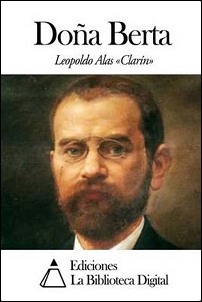
Leopoldo Alas (25 april 1852 – 13 juni 1901)
Cover
Zie voor nog meer schrijvers van de 25e april ook mijn blog van 25 april 2018 en ook mijn blog van 25 april 2016 en mijn blog van 25 april 2015 deel 2.

